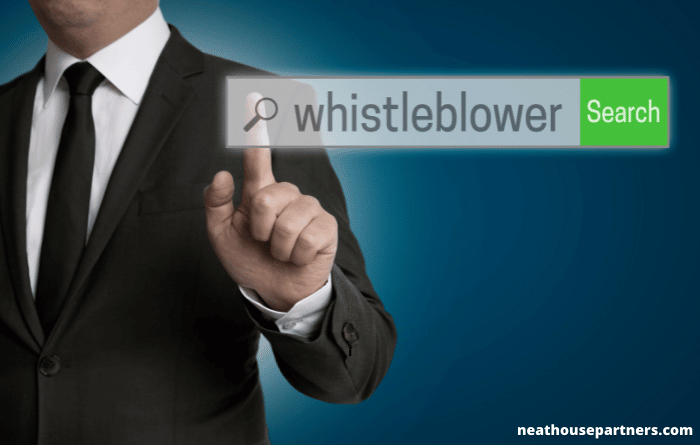Public Concern At Work – What You Need To Know
In this article, we’ll explain more about the work of Protect, as well as exploring the concept of whistleblowing in more detail.
James Rowland
Commercial Director James leads Account Management, Sales and Marketing at Neathouse Partners.Date
12 December 2021Updated
07 August 2024
Table of contents
Related articles
Tags
For 25 years, Public Concern At Work was the leading whistleblowing charity in the UK. However, in 2018, this charity changed its name to Protect, as well as adding the strapline ‘speak up, stop harm’. This change of name was decided on to remove any confusion that could have been associated with the old name and to make the mission of the charity clear.
In this article, we’ll explain more about the work of Protect, as well as exploring the concept of whistleblowing in more detail. We’ll take a look at the type of complaints that would fall into the category of whistleblowing, as well as discussing how you can support and protect employees during the whistleblowing process.
What Is The New Name Of Public Concern At Work?
In September 2018, Public Concern At Work announced that it was changing its name to Protect. This decision was made as a result of ongoing confusion which resulted in many people believing that the organisation only supported whistleblowers in the public sector, rather than across all industry.
It also added the strapline ‘speak up, stop harm’, giving clarity to the mission of the charity. This represents the charity’s goal in supporting whistleblowers in every organisation and helping to protect their rights, including protecting them from unfair treatment or dismissal arising from their whistleblowing.
Read on to find out more about whistleblowing and how you can support employees within your organisation, should they need to go through the whistleblowing process.
What Is Meant By The Term Whistleblowing?
Whistleblowing is a term that is used to describe an employee who raises concerns within the workplace. This could include harmful or illegal practices within the workplace that raise serious issues of public interest, for example putting members of the public at risk.
Employees that whistle blow are protected by law. This means that they cannot be treated unfairly or dismissed as a result of their whistleblowing.
Types Of Whistleblowing
There are two main types of whistleblowing: internal whistleblowing and external whistleblowing.
Internal whistleblowing involves an employee reporting illegal activity or misconduct to a manager or HR representative within the organisation. This means that the reporting is kept within the organisation and may be dealt with internally, although the organisation may decide to get external parties involved if required.
External whistleblowing involves reporting the illegal activity or misconduct to an external organisation. This could include reporting the issue to a statutory body, a union, the police or a lawyer.
What Complaints Count As Whistleblowing?
Whilst some complaints will fall into the category of whistleblowing, others may instead be a grievance. The UK government has published a list of complaints which count as whistleblowing. Here are some of the examples provided:
- Illegal activity which would constitute a criminal offence, for example fraud.
- Action or negligence which would put a person’s health and safety at risk.
- Risk of damage or actual damage to the environment.
- The organisation is acting unlawfully, for example by not holding the correct insurance.
- The employee believes that someone is covering up illegal activity, misconduct or wrongdoing.

How Are Whistleblowers Protected?
Whistleblowers are important to maintaining a workforce that is free from illegal or unethical practices. While some people may believe that whistleblowers should suffer retribution for speaking out, the majority of employers will go to great lengths to protect employees who speak up about workplace violations and unethical practice.
Let’s take a look at how both employers and the law protect whistleblowers.
What Employers Can Do:
If an employee decides to make a whistleblowing disclosure, it’s important that you reassure them that their disclosure will be kept confidential and that their position at work will not be affected. It’s important to ensure that this confidentiality is maintained throughout the investigation, as far as possible.
You may also need to consider who leads on the investigation. It may be appropriate for this to be the manager to whom the initial disclosure was made, or there may be a more appropriate person to handle the investigation. However, all parties involved should be aware of the requirement for confidentiality.
What The Law Provides:
Whistleblowers are offered protection under UK law. This means that a whistleblower cannot be treated unfairly as a result of their whistleblowing. This includes dismissal, demotion, harassment or other penalties that arise due to the disclosure.
If a whistleblower is treated unfairly or dismissed due to their whistleblowing, they may be able to make a claim at an employment tribunal. This claim can be made up to three months after the end of their employment.
What Is The Difference Between Whistleblowing And A Grievance?
Whistleblowing and a grievance both involve an employee reporting something that they feel is wrong. However, there are some important differences between them that set them apart, that you should be aware of.
Let’s take a look at the differences between a grievance and whistleblowing.
What Is Whistleblowing?
Whistleblowing involves an employee reporting an act of wrongdoing or a threat to public safety. They do this in accordance with legislation which give them protection against reprisals for making such reports.
With whistleblowing, the report is usually against one individual, rather than the company as a whole. The aim of whistleblowing is to protect the organisation, exposing wrongdoing that could cause harm to public health or damage to the image of the organisation.
What Is A Grievance?
A grievance is a formal complaint by an employee about their working conditions or treatment by their employer. It can also be a complaint about the terms and conditions of a collective agreement.
Unlike whistleblowing, a grievance is usually made against the organisation itself, rather than a single individual.
Whistleblowing Vs Grievance
Whistleblowing and a grievance both have an important role to play in ensuring that wrongdoing is reported and that public safety is protected. It is important to know the difference between the two so that you ensure that complaints are reported in the correct way.
The main key difference between whistleblowing and a grievance is that a grievance usually exists between an employee and an employer, whilst whistleblowing usually involves the employee trying to protect the organisation by exposing wrongdoing.

Benefits Of Whistleblowing For The Organisation
Many organisations are wary of whistleblowing, concerned that the complaint may paint the organisation in a bad light and result in bad press. However, it’s important to remember that the main purpose of whistleblowing is the protect the organisation from potential legal action, reputational damage and law suits.
Let’s take a look at some of the benefits of whistleblowing for the organisation.
- Minimise the business’ exposure to risk.
- Standing behind the whistleblower can increase the confidence of shareholders as they know that the business is doing the right thing.
- Boost the corporate social responsibility of the business.
- Reduce the risk of legal action being taken against the company.
- Help to protect customers against potential fraud.
- Protect the interests of shareholders, employees and customers.
- Encourage open communication and honesty between employees and management.
Is A Whistleblowing Policy A Legal Requirement?
In the UK, there is no legal requirement for the majority of businesses to have a whistleblowing policy. However, there are some listed companies under the Corporate Governance Code who are required to have a whistleblowing policy in place, or to be able to explain why they do not have one if asked.
Whilst it is not a legal requirement, it is strongly recommended that every organisation has a whistleblowing policy which outlines the procedure that will be followed if a disclosure is made. This can help to ensure that a consistent process is followed when a whistleblowing disclosure is made and that the correct people are involved in the investigation.
Having a whistleblowing policy can also help employees to feel reassured, should they need to make a disclosure. The policy may help to reassure the employee that their disclosure will be taken seriously and handled appropriately, and that they will not be at risk of disadvantage as a result of the disclosure.
Can An Employee Be Fired For Whistleblowing?
Whistleblowers are protected by law. This means that an employee cannot be fired, treated unfairly or disadvantaged as a result of whistleblowing.
If an employee is treated unfairly or disadvantaged as a result of their whistleblowing, they may be able to take their case to an employment tribunal to make a claim. If the claim is for unfair dismissal, it must be made within 3 months of the end date of their employment.
Does Blowing The Whistle Violate Company Loyalty?
It is a common misconception that employees who blow the whistle are not loyal to their company. In fact, the opposite is often true. This is because the main goal of whistleblowing is to protect the organisation, as well as its stakeholders and customers, from wrongful activity.
An employee who raises issues such as fraud or misconduct is demonstrating their loyalty to their business, exposing wrongdoing that could otherwise threaten the reputation of the business.
It’s important that businesses understand the value of whistleblowing, rather than viewing the disclosure as a complaint against the business. By correcting wrongful activity, you can help to protect your customers, as well as the reputation of the business.

Are There Ethical Circumstances Where Whistleblowing Is Inappropriate?
You might be wondering whether there are any ethical circumstances where whistleblowing would be seen as inappropriate. Indeed, for an employee, there can often be an ethical conflict when it comes to whistleblowing, when they have to make the choice between violating the trust of a co-worker and protecting the interests of the organisation.
However, whistleblowing is part of an ethical obligation to act responsibly. An employee that takes the decision to whistleblow typically does so in the best interests of the organisation and the public. They may feel like they are taking risks in order to whistleblow, so it is important that this is recognised, and that they are not treated unfairly as a result of their whistleblowing.
Related Questions
Can A Whistleblower Remain Anonymous?
It is possible to make a whistleblowing disclosure anonymously. However, the claim may not be able to be taken any further if sufficient information has not been provided. This is because the employer will not know who to ask for further details if required.
Alternatively, the whistleblower could provide their name with the report but request confidentiality. In this case, the employer or official body must make every effort to keep the disclosure confidential, unless the whistleblower later consents to their identity being revealed.
Why Is Whistleblowing A Controversial Activity?
Some people see whistleblowing as a controversial activity. This is because whistleblowing involves exposing wrongdoing within an organisation. However, the disclosure that is made will be in the interests of both the public and the organisation, protecting the business from potential damaging activities.
In Summary
Whistleblowing is something that everyone within an organisation should be aware of, including senior managers, HR workers and general employees. It is everyone’s responsibility to blow the whistle and report potential harmful activity, protecting the interests of both the public and the organisation itself.
The leading whistleblowing charity, Protect, changed its name from Public Concern At Work in 2018, in an attempt to combat the misconception that the charity only supported those in the public sector. In fact, Protect is a charity that supports any employee that decides to blow the whistle and alert the business or an official organisation about illegal activity or misconduct within an organisation.
Looking for advice on whistleblowing? Our expert team is here to help. Contact us today for advice on HR and employment law.
Related blog posts

Breach of Employment Contract
Unlawful Deduction of Wages

What To Do When An Employee Goes Off With Stress Before A Disciplinary Hearing
Have questions?
Get in touch today
Contact us, and our team will get back to you within 24 hours. We value your questions and are committed to getting them answered quickly.


Hello! I am Nicky
Just fill in the form below with your details, and I will arrange for a member of our team to give you a call.
By clicking, you agree to our Privacy Policy



